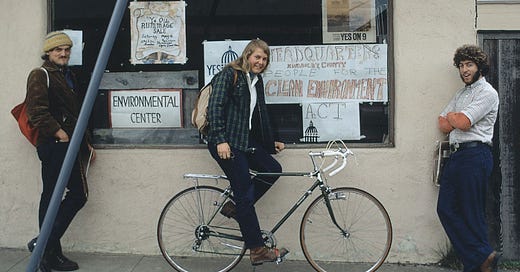In a recent column, "what drives progressives to the right," the New York Times’ Michelle Goldberg wrote that liberals have lost hope for the future, while the right has an advantage: "It doesn’t have to provide a compelling view of the future. All it needs is a romantic conception of the past.”
Well, okay – so maybe what liberals need is to adopt a time in the past to glamorize. We need to decide when America was great, and harness the powerful force of nostalgia for ourselves.
But is there a time that liberals can embrace? What can we proudly point to as America’s finest hour?
Ladies and gentlemen, I give you the year whose 50th anniversary we have been living through: 1973.
Now, I know that I am biased: I was ten years old in 1973, and ten is a pretty happy age. But it’s an objective fact that if you want to pick a year to be nostalgic about, you can’t beat 1973.
1973 was the last year of the great postwar economic expansion. Between 1947 to 1973, the standard of living of all Americans dramatically improved. Productivity improved rapidly and the resulting prosperity was widely shared. After 1973, productivity growth slowed, but even more importantly, the benefits of increased productivity stopped being shared. Inequality skyrocketed. Middle-class wages have stagnated ever since. For the middle class, 1973 was the Last Great Year.
If you believe in Constitutional government, and the power of facts to overcome partisanship, you gotta love 1973. Revelation after Watergate revelation shocked the country. Nixon’s popularity plummeted. He didn’t leave until August 1974, but the handwriting was on the wall. The difference between the Watergate era and the scandal-ridden Trump years was profound. There was no Fox News. There wasn’t any 40% of the public that would support Nixon no matter what.
But if you believed in the possibility that the power of the Presidency can be used for good, you could also love 1973. The crook was doing a hell of a job. He ended the war in Vietnam – after years of carnage and war crimes, yes, but he did end it. He continued the policy of détente with the USSR; Brezhnev came to Washington; the cold war was defrosting. Nixon championed, and signed, the Endangered Species Act – the third of the landmark environmental laws passed on his watch.
If you cared about women’s rights, 1973 was an electric year. The Supreme Court decided Roe v. Wade. And Billie Jean King beat Bobby Riggs. And yes, young people, that was a big deal! I was only ten, and I knew it was a world-historic event. If you don’t believe me, rent the movie “Battle of the Sexes.”
It was still a very rough time to be gay. In fact, the Supreme Court upheld a Florida anti-gay statute. But something else happened that hinted at better times. The American Psychiatric Association removed homosexuality from its list of “mental disorders.” (A Philadelphia paper’s front-page headline: "Twenty Million Homosexuals Gain Instant Cure.")
If you were Black, you didn’t get an equal share in the magic economy – but things were getting better. Black men’s weekly earnings had risen from 69% of white men’s in 1967 to 77% in 1973, especially impressive given that white men’s wages were rising. One big reason for that: in 1973, over 40% of Black men were in union jobs.
And if you were a sports fan - well, you saw what was simply, unquestionably, the greatest year in the history of American sports. The Miami Dolphins started the year by winning the Super Bowl and closing out what is still the only undefeated season in NFL history. The UCLA Bruins also went undefeated, with Bill Walton turning in one of the greatest performances in college basketball history in the title game. The New York Knicks beat the Los Angeles Lakers in the NBA Finals, avenging their loss the previous year. The New York Mets, a rag-tag bunch, made an improbable run to Game 7 of the World Series, under the slogan “You Gotta Believe.” And, greatest of all, Secretariat not only won the Triple Crown, but set records in all three races that still stand today.
If you lived through 1973, you know that once upon a time, there was hope. In 1973, it was not unreasonable to believe that the future of the United States could be a future of shared prosperity; of peace; of equality for women, people of color, and gay people; and of jaw-dropping performances in sports.
Let’s make America 1973 again.
Steve Novick is a former Portland City Commissioner. The opinions here are his own; he does not speak for his current employer.




Bipartisan cooperation in Congress was a real thing.
I was in college when Steve Novick was 10 years old. On my shelves, I still have books from that period — when the criminal justice system was poised for big change: more social work, less punishment. It didn’t take long for the results to come in. What followed was public reaction in the form of three-strikes laws, etc. Progressives and civil rights attorneys fought back, persuading lawmakers and voters that public safety didn’t require laws or punishment.
In politics, the pendulum swings back and forth. Nobody learns.
Consider Novick’s reference to Roe v. Wade. Yes, abortion should be legal. But the Democrats and Planned Parenthood turned abortion into a moneymaker. It’s a great fundraiser. It also created a peculiar feminist concept of pro-life where females are emboldened to have babies whether or not they can raise them. One of the leading predictors of poverty is single motherhood.
An important word that Novick leaves out of his reminiscence on 1973: Drugs.
Let’s learn from 1973, not repeat it.